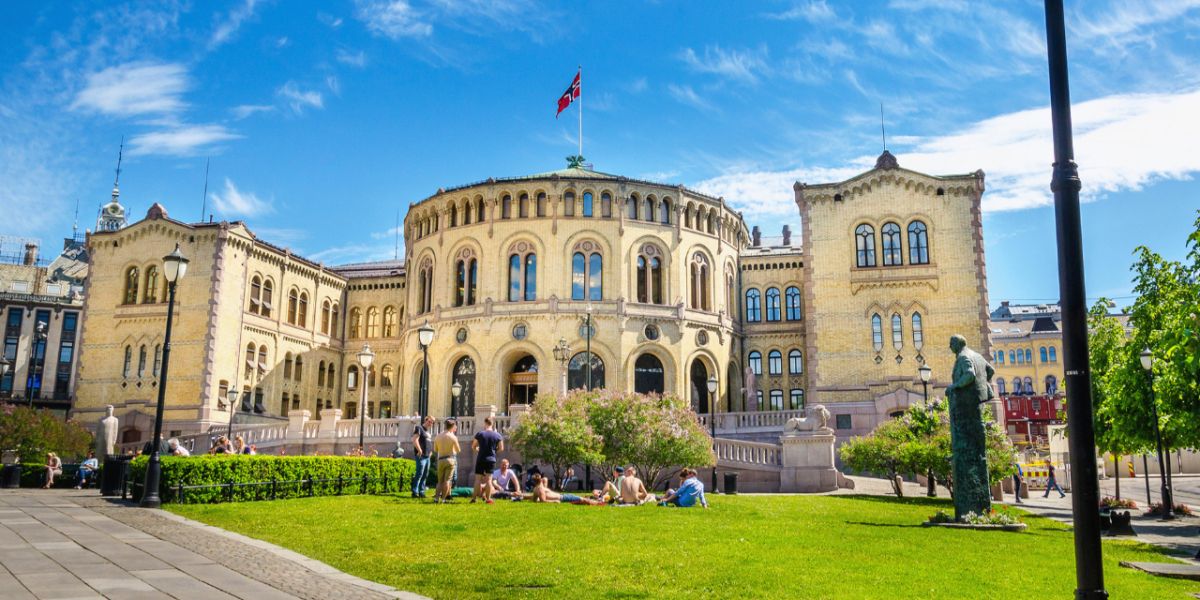
Relatively low unemployment rates compared to other European countries, high salaries, and an excellent quality of life make Norway an attractive destination for job seekers worldwide. Generous paid leave and a robust social welfare system ensure favorable working conditions for employees in Norway.
However, foreigners may face challenges integrating into the Norwegian job market. While attitudes are evolving and opportunities for international workers are expanding across various sectors, such as technology, oil and gas, services, and tourism, proficiency in Norwegian remains a significant advantage in many fields. Prospective employees are encouraged to enroll in language courses before relocating to Norway.
Norwegian economy
The Norwegian economy is a blend of capitalism and social welfare policies, heavily reliant on natural resources like oil and gas, which account for a significant portion of exports.
With one of the highest GDPs per capita globally, Norway is also investing in renewable energy to ensure sustainable development. The public sector plays a pivotal role by providing essential social services. To mitigate risks associated with volatile commodity prices, the country is working to diversify its economy.
Jobs for foreigners in Norway
Norway is increasingly welcoming foreign workers, particularly in the following sectors:
- Information technology (IT) and digital services: A rapidly growing sector offering many opportunities where English proficiency is often sufficient. Roles such as developers, engineers, and data analysts are in high demand.
- Oil and gas industry: A cornerstone of Norway's economy, where English is frequently the working language.
- Tourism and hospitality: Seasonal and entry-level positions, including servers, tourist guides in fjords or national parks, and ski instructors, are commonly available during the season.
- Fishing and agriculture: Seasonal roles like fruit picking typically do not require Norwegian proficiency.
For qualified jobs in other industries, Norwegian language skills are usually necessary. While many large international companies in Norway operate in English, learning Norwegian is vital for deeper professional and social integration. Some employers may offer or subsidize Norwegian language courses.
In-demand skills in Norway
Norway values soft skills such as teamwork, adaptability, and effective communication in its collaborative work environment. Candidates, particularly expatriates, must demonstrate resilience and the ability to adapt to new work cultures and manage stress effectively.
Proficiency in English, with Norwegian as an added advantage, significantly boosts employability.
Norwegian language courses for foreigners
To facilitate integration, most municipalities in Norway offer Norwegian language courses to newcomers. These may be mandatory for individuals with work permits leading to permanent residency. Typically, 300 hours of instruction are required to qualify for this status. While not obligatory for others, these courses are strongly recommended.
Course costs vary by municipality, and employers may cover the fees in some cases. Online learning options are also available for remote learning.
For further details, consult resources like the Ny i Norge website or contact your local municipality.
Salaries and employment conditions in Norway
Salaries in Norway are among the highest in the world, matched by a high cost of living. Average wages vary by sector and are often determined through collective agreements. As a guideline, hourly wages for unskilled workers range between €20 and €25, depending on the sector.
Platforms like Payscale provide up-to-date salary benchmarks. Higher salaries are standard for skilled professionals in fields like technology and oil. For instance, petroleum engineers earn between NOK 700,000 and NOK 900,000 annually, while project managers may earn up to NOK 2,000,000 per year.
Leave and work hours in Norway
In Norway, labor laws and collective agreements play a crucial role in safeguarding employees' rights and promoting fair working conditions.
Paid leave and overtime
Employees in Norway are entitled to five weeks of paid vacation annually, with even better benefits in certain sectors.
The legal maximum working time is 40 hours per week, with additional hours classified as overtime, compensated at a minimum 40% premium. Legal caps exist on overtime hours, but specific agreements can be negotiated between employers and employees.
For detailed regulations, visit the official Norwegian Labor Inspection Authority (Arbeidstilsynet) website.
Sick leave
Employees in Norway are entitled to paid sick leave. Employers cover the first 16 days of absence, provided the employee has worked at the company for at least two months. Beyond that, the Norwegian National Insurance Scheme (NAV) provides daily benefits for up to one year. Employees can self-certify sick leave for up to three days, up to four times a year, without a medical certificate.
Parental leave
Parents in Norway are entitled to a total parental leave (foreldrepengerperioden) period of 49 weeks at 100% pay or 61 weeks + 1 day at 80% pay. This leave is allocated between the mother and the father with flexibility. Typically, one-third of the leave is designated for the mother (mother's quota), one-third for the father/co-mother (father's/co-mother's quota), and the remaining one-third is for a shared period that the parents can divide according to their preference.
This means that each parent is entitled to 15 weeks of full-time leave. Three weeks before the due date are reserved for the mother, but these do not count towards the three-way division. Mothers may start their leave up to 12 weeks before the expected due date. In contrast, fathers can take up to two weeks of leave related to the birth (either before or after), but this leave is not automatically paid and depends on the terms of the employment contract.
Public holidays
Norway has 10 public holidays in addition to five weeks of paid vacation. These include New Year's Day, Maundy Thursday, Good Friday, Easter Monday, May 1st (Labor Day), Constitution Day (May 17th), Christmas Day (December 25th), and Boxing Day (December 26th). Specific labor agreements may outline additional provisions for working on these days.
We do our best to provide accurate and up to date information. However, if you have noticed any inaccuracies in this article, please let us know in the comments section below.








